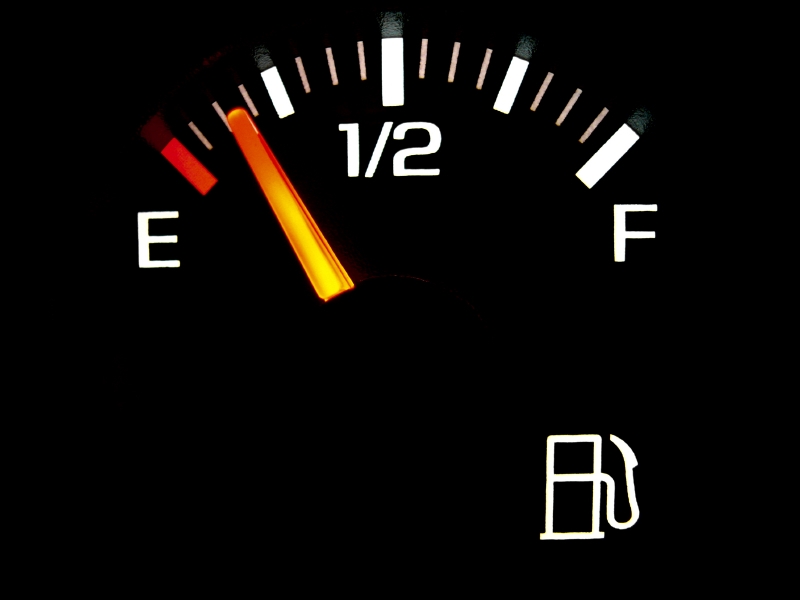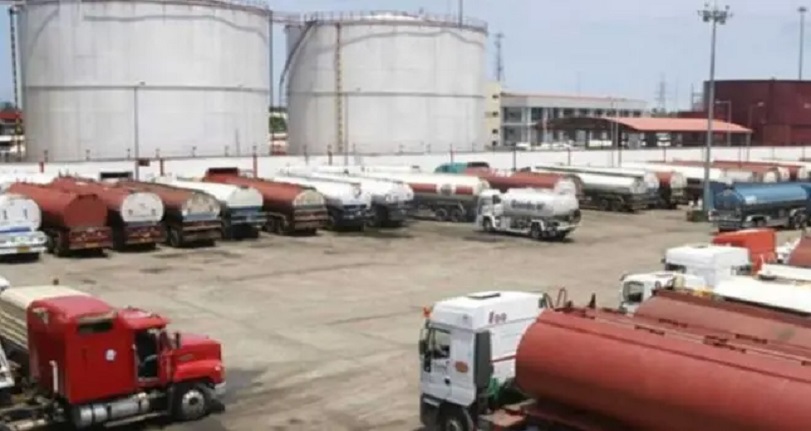Economy
Nigeria Used N596b To Import Fuel In 6 Months

By Dipo Olowookere
About N596 billion was used to import Premium Motor Spirit (PMS), commonly called petrol of fuel, into the country in the first six months of 2016.
This is according to data from the National Bureau of Statistics (NBS).
According to the NBS, Nigeria, which is currently battling declining economic fortunes, spent N276.226 billion on petrol import in the first quarter of 2016, while N319.28 billion was spent in the second quarter.
The figure showed that in the second half of 2015, N561.2 billion was spent to import petrol into the country, indicating that the amount appreciated by 6.1 percent compared with the 2016 figure.
However, the report pointed out that the amount spent on fuel import in the first half of 2016 was 12.18 percent lower, which is N82.63 billion less than the N678.13 billion spent on fuel imports in the first half of 2015.
The report also highlighted that the country spent N1.24 trillion on the importation of fuel in 2015.
For the first half of 2016, the NBS disclosed that Nigeria recorded total imports of N3.57 trillion. This meant that fuel imports accounted for 16.7 percent of Nigeria’s total import in the first six months of 2016.
Also, data obtained from the Central Bank of Nigeria (CBN) revealed that the oil sector accounted for 19 percent of total foreign exchange disbursements of $5.85 billion by the CBN in the first quarter of 2016.
On the other hand, the CBN noted that in the second quarter of 2016, the oil sector accounted for 23.3 per cent of the $6.09 billion foreign exchange disbursed by the CBN in the second quarter of 2016.
Recently, though, the difficulty in accessing foreign exchange and the declining value of the naira had made imported fuel expensive, a development which had led to calls in some quarters for a further hike in the price of the commodity.
This situation was further worsened by the inability of the country to fix the refineries, making the country to rely mainly on importation and other arrangements entered into by the NNPC, for about 95 per cent of the country’s fuel consumption.
Expectedly, the rising fuel imports had helped in no small measure in putting additional pressures on the country’s foreign reserves and contributing to the worsening economic situation.
Economy
Customs Area 1 Command Generates N288.8bn to Beat 2025 Target by 33%

By Bon Peters
The Area 1 Command of the Nigeria Customs Service (NCS) in Port Harcourt, Rivers State, surpassed its 2025 revenue target by generating about N288.8 billion.
In the preceding financial year, the command generated N200.8 billion as revenue, indicating a year-on-year growth of 43.83 per cent.
Addressing journalists in Port Harcourt, the Customs Area 1 Controller, Comptroller Salamatu Atuluku, disclosed that the target for the command last year was N216.9 billion, indicating that this was surpassed by N71.8 billion or 33.1 per cent.
She attributed this achievement to the effectiveness of improved compliance monitoring, enhanced cargo examination processes, automation-driven controls, and sustained stakeholder sensitization.
According to her, the monthly revenue performance remained consistently strong throughout the year, with the highest collection recorded in October 2025 at N33.7 billion.
On export trade facilitation, she hinted that in line with the federal government’s economic diversification agenda, the command intensified efforts toward facilitating legitimate export trade, adding that within the year under review, it processed a total export volume of over a million metric tons, comprising both oil and non-oil commodities with a Free on Board (FOB) value of $463.6 million, which she said contributed meaningfully to Nigeria’s foreign exchange earnings.
In addition, Ms Atuluku stated that N838.02 million was paid as Nigeria Export Supervision Scheme (NESS) charges for both oil and non-oil exports during the year, noting that this reflected an increased exporter participation, improved documentation compliance, and the command’s deliberate efforts to streamline export procedures while ensuring adherence to extant regulations.
On anti-smuggling and enforcement activities, it was disclosed that the command sustained vigorous enforcement operations throughout 2025, deploying intelligence-led interventions, risk profiling, and routine cargo examinations to curb smuggling and protect national interests, resulting in the interception of undeclared pharmaceutical products at the NACHO shed.
The items intercepted included Progesterone 100mg/2ml, and Isifrane IP 250ml among others, discovered in three packages without the mandatory NAFDAC regulatory certification, contrary to import guidelines governing pharmaceutical products, the Controller stated.
In the year under review, the personnel of the command benefitted from periodic training programs, sensitization sessions, operational briefings, and system-focused engagements, particularly in areas of customs automation, risk management, enforcement procedures, and trade facilitation.
On infrastructural development, the command renovated the Quarter Guard, thereby enhancing access control, security coordination, and command presence at the main entry point, including the Command Staff Clinic which was renovated and upgraded to improve healthcare delivery and working conditions for medical personnel, and beneficiaries.
Also, the command executed a Corporate Social Responsibility (CSR) intervention on December 11, 2025, at the Model Primary School I and II, Orominike, D-Line, Port Harcourt, with the donation of customs-branded notebooks, school bags, and school uniforms, aimed at supporting basic education and easing the burden on pupils and parents within the host community.
Economy
FrieslandCampina, Okitipupa Trigger 0.64% Loss at NASD OTC Bourse

By Adedapo Adesanya
Five securities caused the NASD Over-the-Counter (OTC) Securities Exchange to experience a setback of 0.64 per cent on Monday, February 2.
During the first trading session of February 2026, FrieslandCampinaWamco Nigeria Plc shrank by N4.46 to end at N63.54 per unit versus the previous session’s N68.00 per unit, as Okitipupa Plc depreciated by N3.83 to close at N230.77 per share versus last Friday’s N234.60 per share.
Further, Central Securities Clearing System (CSCS) dropped 50 Kobo to sell at N40.00 per unit compared with the previous closing price of N40.50 per unit, UBN Property Plc dipped by 21 Kobo to N1.99 per share from N2.20 per share, and Acorn Petroleum Plc lost 3 Kobo to end at N1.35 per unit versus N1.38 per unit.
As a result, the market capitalisation went down by N13.98 billion to settle at N2.158 trillion, in contrast to the previous value of N2.171 trillion, and the NASD Unlisted Security Index (NSI) contracted by 23.35 points to settle at 3,606.76 points compared with last Friday’s closing value of 3,630.11 points.
Amid the loss, Geo-Fluids Plc managed to finish green after it chalked up 9 Kobo to sell at N6.84 per share versus the N5.75 per share it ended in the last trading day.
Yesterday, the volume of securities traded by investors surged by 1,238.5 per cent to 3.9 million units from 287,618 units, the value of securities increased by 1,075.2 per cent to N36.0 million from N3.1 million, and the number of deals soared by 90.5 per cent to 40 deals from 21 deals.
At the close of trades, CSCS Plc remained the most traded stock by value (year-to-date) with 15.4 million units valued at N623.9 million, followed by FrieslandCampina Wamco Nigeria Plc with 1.7 million units worth N110.2 million, and Geo-Fluids Plc with 10.6 million units sold for N69.9 million.
CSCS Plc was also the most active stock by volume (year-to-date) with 15.4 million units traded for N623.9 million, trailed by Geo-Fluids Plc with 10.6 million units worth N69.9 million, and Mass Telecom Innovation Plc with 10.1 million units transacted for N4.1 million.
Economy
Renewed FX Pressure Weakens Naira to N1,390/$1 at Official Market

By Adedapo Adesanya
The value of the Naira dropped against the United States Dollar in the the Nigerian Autonomous Foreign Exchange Market (NAFEX) on Monday, February 2 by N3.81 or 0.27 per cent to N1,390.36/$1 from the N1,386.55/$1 it traded last Friday.
This was driven by stronger demand for forex at the official market, which outweighed to what was available to meet customers’ needs. But the local currency remained within the expected trading range.
In the same market window, the domestic currency further appreciated against the Pound Sterling during the session by N6.72 to close at N1,899.51/£1 compared with the preceding session’s rate of N1,906.23/£1 and improved against the Euro by N7.70 to trade at N1,644.52/€1 versus the previous trading day’s value of N1,652.22/€1.
In the parallel market, the exchange rate of the Nigerian Naira to its American counterpart remained unchanged yesterday at N1,465/$1 and at the GTBank FX counter, it also maintained stability at N1,419/$1.
The Naira is expected to remain relatively stable in the coming days, boosted by stronger FX liquidity, enhanced price discovery, and a gradual restoration of offshore investor confidence while Nigeria’s external reserves, which provide the Central Bank of Nigeria (CBN) with the capacity to defend the Naira and stabilise the foreign exchange market, have continued to grow steadily.
Updated data showed that Nigeria’s gross external reserves printed at $46.18 billion as of January 29, 2026, reflecting an addition of $62.40 million.
As for the cryptocurrency market, it was bullish after a sharp weekend sell-off while a resurgent US Dollar index, which has logged its strongest two-day gain in nine months, threatened to keep gains in check.
Expectations that US Federal Reserve chair nominee, Mr Kevin Warsh, will be cautious on interest-rate cuts, along with upcoming US jobs data, are seen as potential drivers of further Dollar strength.
The biggest gainer for the session was Cardano (ADA), which rose by 6.2 per cent to trade at $0.2976, Ethereum (ETH) appreciated by 5.5 per cent to $2,319.80, Dogecoin (DOGE) grew by 5.3 per cent to $0.1066, Binance Coin (BNB) gained 4.8 per cent to sell for $776.00, and Solana (SOL) added 4.6 per cent to sell at $103.75.
In addition, Litecoin (LTC) improved by 4.5 per cent to trade at $59.95, Bitcoin (BTC) appreciated by 3.6 per cent to $78,445.62, and Ripple (XRP) expanded by 3.4 per cent to $1.60, while the US Dollar Tether (USDT) and the US Dollar Coin (USDC) traded flat at $1.00 each.
-

 Feature/OPED6 years ago
Feature/OPED6 years agoDavos was Different this year
-
Travel/Tourism9 years ago
Lagos Seals Western Lodge Hotel In Ikorodu
-

 Showbiz3 years ago
Showbiz3 years agoEstranged Lover Releases Videos of Empress Njamah Bathing
-

 Banking8 years ago
Banking8 years agoSort Codes of GTBank Branches in Nigeria
-

 Economy3 years ago
Economy3 years agoSubsidy Removal: CNG at N130 Per Litre Cheaper Than Petrol—IPMAN
-

 Banking3 years ago
Banking3 years agoSort Codes of UBA Branches in Nigeria
-

 Banking3 years ago
Banking3 years agoFirst Bank Announces Planned Downtime
-

 Sports3 years ago
Sports3 years agoHighest Paid Nigerian Footballer – How Much Do Nigerian Footballers Earn






















